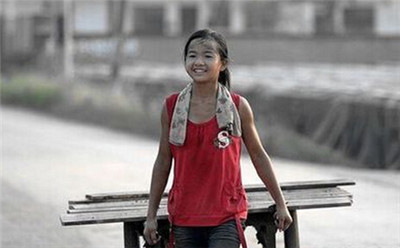(单词翻译:单击)
THERE I was, at the height of the great Disco Summer, selling hot dogs in the shadow of a six-story, elephant-shaped building on the shores of Margate, N.J. Most nights, my shift started at midnight. It was June 1977, just after my freshman year at Wesleyan, and I was hard at work at Lenny’s Hot Dogs.
那是迪斯科音乐正值流行的夏天,在新泽西州马盖特市的海滩边,我在一座大象形状的六层建筑的阴影下卖热狗。很多时候,我的班次都是从午夜开始。那是1977年6月,我在卫斯理大学(Wesleyan)刚刚结束了大一的课程,正努力在雷尼热狗店(Lenny’s Hot Dogs)工作。

The big rush came just after 3 a.m., when the disco across the street, The Music Box, unplugged its rotating mirror ball and its denizens spilled out in search of hot dogs, frozen yogurt cones and Lenny’s pepper hash. At that late hour the lines stretched from Lenny’s across the parking lot, past Lucy the Elephant, and toward the rumbling Atlantic beyond.
汹涌的客流在刚过凌晨3点时涌来,那时街对面的迪斯科舞厅“音乐盒”(The Music Box)关掉了旋转的水晶球,舞厅里的人群涌出来寻找热狗、冻酸奶蛋卷和雷尼辣椒碎。在深夜里的那个时刻,顾客的队伍从雷尼热狗店一直向后排,穿过停车场、经过大象露西(Lucy the Elephant),一直向汹涌的大西洋的方向延伸。
Lucy the Elephant is now a National Historic Landmark, but Lenny’s, sadly, has been gone for decades. Still, plenty of freshmen will spend this summer selling hot dogs, waiting tables, tending bar or supervising the archery range at clam shacks, taverns and summer camps from Maine to California.
大象露西现在是一处国家历史名胜,但是很遗憾雷尼热狗店已经关门几十年了。不过,还是有很多大一的学生在暑假卖热狗、在餐厅当服务员、在酒吧当酒保,或者看管靶场,从缅因州到加州各个地方的海鲜餐馆、旅店和度假营地都有他们的工作。
One question, of course, is what kind of work is best for college students?
当然,有一个问题是,什么样的工作对大学生是最有益的?
For many, summer employment means taking whatever job can best reduce the burden of debt, which was more than $30,000, on average, for members of the class of 2015.
对很多人来说,夏季的工作经历意味着接受一份最能减轻债务负担的随便什么工作。对2015级新生来说,平均债务负担超过3万美元。
Other students, both with and without the burden of debt, feel the pressure to take on internships. The fields of politics, media and entertainment, to name three, now virtually demand a period of unpaid work.
其他学生,无论有没有债务负担,也都感受到了从事实习工作的紧迫性。试举三例,政治、媒体、娱乐领域,现在实际上必须经历一段无薪工作的时间。
But there are times, I suspect, when a mind is a terrible thing not to waste.
但我猜想,有些时候不让头脑浪费一下,就太糟了。
One example of a mind well wasted is that of my friend Richard Russo. Richard, who is now a novelist, worked on a construction crew, not as the guy who worked the jackhammer, but as that guy’s assistant. One day they had to break up a concrete wall, and it was Richard’s job to hold the business end of the jackhammer steady — and horizontal — while the other guy operated it, leaving Richard feeling, for the rest of the summer, as if his brains had actually bounced around the inside of his skull. I had another friend, Billy Warden, who dug graves one summer and learned, on the occasion of some not very deeply buried 19th-century caskets collapsing just beneath the place where he was standing, what it was like to be hip deep in dead guys.
完全浪费头脑的一个例子就是我的朋友理查德·罗索(Richard Russo)。现在已经成为小说家的罗索曾经在建筑工地工作,不是操作风钻的那个家伙,而是他的助手。有一天,他们要拆掉一堵混凝土墙,理查德的工作是抓稳风钻钻头的一边,保持稳定,而另一个人操作风钻。这导致理查德一整个夏天都觉得自己的脑子真的在头颅里面弹来弹去。我还有另外一个朋友,比利·沃登(Billy Warden),他有一年夏天挖掘坟墓。有一次在某个埋着19世纪棺椁的坟地,墓穴比较浅,就在他站的地方塌陷了。他由此知道了站在齐腰深的死人堆里是什么感觉。
I had a lot of so-called stupid jobs between high school and the time I turned 30. I sold hot dogs. I worked as an office temp. I was a messenger. I sold T-shirts at Grateful Dead concerts. (They sold faster when I hawked them with a British accent.) I cleared brush. I cleaned swimming pools.
我在高中毕业到30岁之前,做过很多所谓愚蠢的工作。我卖过热狗、当过办公室临时工、当过收发员。我在“感恩而死”(Grateful Dead)的演唱会上卖过T恤衫。(我用英国口音兜售的时候,卖得还更快一些。)我清洗过刷子,也清洗过游泳池。
And for years and years and years, I mowed lawns.
我还割草坪,割过很多很多很多年。
There was a lot to like about mowing lawns. For one, the smells: the sharp, green scent of freshly cut grass, the fumes of gasoline, the whiff of exhaust. Then there was the sound: the endless roar that made it impossible to hear anything else, including the voice of the irate homeowner standing less than two feet away, yelling that I’d run right over his tulips. It was dramatic, too: Sometimes I’d plow through a field of fallen apples and applesauce would spew out of the mower in a shocking arc of sweet-smelling goo. Other times, I’d run straight over a rock, and the mower would stop with a tremendous clang, as if the engine itself had just been executed, military-style, by firing squad.
割草坪的工作有许多让人喜欢的地方。比如,它的味道:刚刚割过的青草的那强烈而清新的香味、汽油的味道、废气。还有声音:那让你听不见任何其他声音的无休止的轰鸣,包括不到两英尺开外那位愤怒的屋主,大喊着我要踩到他的郁金香了。它也很有戏剧性:有时我会割过一块落满了苹果的草地,苹果泥就会从割草机里喷出来,散发着香甜气味的粘液呈现出一道惊人的弧线。有时,我还会碰到石头,割草机就会停止工作,发出一声巨响,好像发动机自身刚刚被一支军人行刑队给处决了。
The summer after I worked at Lenny’s, I was a teller at Continental Bank in Philadelphia. I thought it was clever to give my customers their money in $2 bills, or in Eisenhower dollar coins, or in some strange combination of Kennedy half-dollars and $50 bills. My drawer, at the end of day, was always “under” or “over,” and all the other tellers had to stand around as I counted and re-counted the float. One time, I accidentally left $10,000 by the coffee maker in the lounge. I had no choice except to tell my boss the truth: I’d been on my way to the safe with the cash when I remembered we were out of creamer.
在雷尼热狗店之后的那个夏天,我在费城的一家大陆银行(Continental Bank)做柜员。我以为把钱以两美元钞票、艾森豪威尔硬币、或以肯尼迪的0.5美元和50美元钞票等奇怪的面值组合交给顾客是很聪明的。每天下班时,我的抽屉不是“太少”就是“太多”,其他的所有柜员都得站在周围,等着我清点、再清点找零备用金。有一次,我不小心把1万美元落在休息室的咖啡机旁边。我别无选择,只能向老板说明真相:我在拿着钱去保险柜的路上突然想起来,我们没有奶精了。
These jobs made me aware of class privilege in a way that my hours in Econ 101 surely did not. I remember getting back to Wesleyan after my summer at the bank and gushing to a teller, “I was a teller this summer, too!” only to realize, as she glowered at me, that what had been a summer lark for me was, for her, the continuing reality of her working life.
这些工作让我意识到阶级特权,这是我在经济学基础课程里学不到的 。我还记得在银行的暑期工作结束后,我回到卫斯理大学,兴冲冲地对一名柜员说,“我今年暑假也去当柜员了!”结果我只是在她沉着脸看着我的时候意识到,我的一份暑期工作,对她而言却是一辈子望不到头的一份生计。
My own sons are engaged this summer with work that feels more relevant to their college majors — my older boy, the actor, is a production assistant on a television show; my younger, the astronomer, has an internship at an observatory in California, searching for planetoids and brown dwarfs.
我自己的两个儿子今年夏天参加了一些与他们的大学专业更相关的工作——我的大儿子想当演员,目前在一档电视节目中担任制片助理;我的小儿子想成为天文学家,正在加州的一家观象台实习,每天搜寻着小行星和褐矮星。
These are very cool jobs, to be sure, and I am insufferably proud of my sons: How could I not be? But I also wonder whether their summer jobs are as likely to build their characters as their résumés. I am hoping, for their sakes, that these opportunities provide them with both.
当然了,这些都是很酷的工作,我为我的儿子骄傲得不得了:我怎么可能不骄傲?不过我也好奇,这些暑假工作在为简历增砖添瓦的同时,是否也能影响他们的性格。我希望,这些机会能带给两者兼得的收获,这是为了他们好。
One of those mornings after my shift at Lenny’s ended, I walked home along the beach as the constellations of summer — the Scorpion, the Archer — sank in the skies behind the six-story elephant. Later, a flock of sea gulls took wing as I approached, and circled around me as the sun burst over the ocean.
在雷尼工作期间,我在一个夜班之后的清晨,沿着海滨往家走,夏日的星辰——天蝎座、人马座——深深地嵌在六层的大象建筑后的天空里。然后,我的脚步惊起了一群海鸥,它们在我周围盘旋,就在这时,太阳在海面上喷薄而出。
It was several miles back to the house, but I was in no hurry. I had faith that I’d get there in time, if I just kept walking long enough.☐
离家还有几英里路,但我一点也不着急。我相信我会按时到达,只要我走得足够久。


